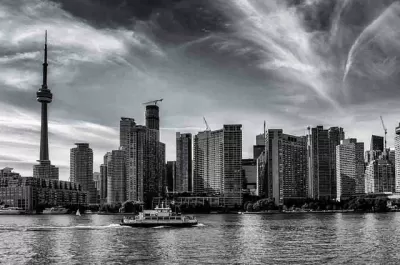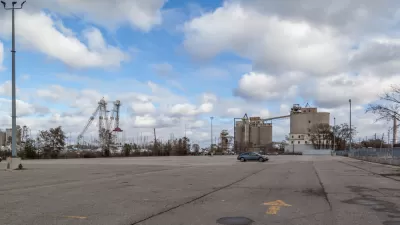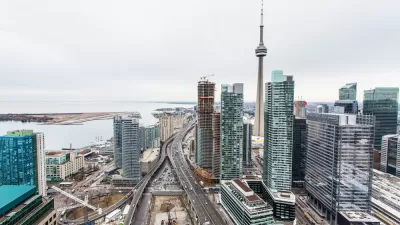Sidewalk Labs' proposals for the Toronto neighborhood of Quayside reveals a preference for ride hailing over public transit.

Paris Marx has read the response to the Request for Proposals for a high-profile "smart city" project in the Toronto neighborhood of Quayside, and what he found will not be welcome among transit advocates.
Marx points to page 133 of the proposal, finding a graph that reveals the transportation priorities of Sidewalk Labs. According to Mark, if Sidewalk Labs pursues its vision, "[t]ransit use would only increase by a single percentage point, while automobile use would be reduced to 15 percent by a larger uptake of walking and cycling (35 percent) and the use of driverless vehicles, ride hailing, and car share services (10 percent)."
There are several specific sections of the proposal that Marx reads as giving priority to ride hailing and driverless vehicles—even potentially over pedestrians and cyclists. The proposals calls for "non-hierarchical streets," for instance, would abandon the complete streets layout that most benefits alternative transportation, according to Marx. The most troubling section of the report, to Marx, is the call for shared ride zones, "where Quayside residents would get subsidized shared-ride trips instead of taking transit."
The article does highlight some portions of the proposal that provide more positives for alternative transportation modes and technological advancements that could potentially benefit every mode but eh automobile. The proposal would extend transit lines to better connect Quayside to the rest of the city's transit infrastructure. Marx is also careful to note the small scale of the project—the neighborhood only covers 12 acres, but Sidewalk Labs does have larger plans to parlay its work in Quayside to the entire East Waterfront neighborhood.
FULL STORY: Sidewalk Toronto Puts Ride Hailing Before Public Transit

Alabama: Trump Terminates Settlements for Black Communities Harmed By Raw Sewage
Trump deemed the landmark civil rights agreement “illegal DEI and environmental justice policy.”

Study: Maui’s Plan to Convert Vacation Rentals to Long-Term Housing Could Cause Nearly $1 Billion Economic Loss
The plan would reduce visitor accommodation by 25% resulting in 1,900 jobs lost.

Why Should We Subsidize Public Transportation?
Many public transit agencies face financial stress due to rising costs, declining fare revenue, and declining subsidies. Transit advocates must provide a strong business case for increasing public transit funding.

Paris Bike Boom Leads to Steep Drop in Air Pollution
The French city’s air quality has improved dramatically in the past 20 years, coinciding with a growth in cycling.

Why Housing Costs More to Build in California Than in Texas
Hard costs like labor and materials combined with ‘soft’ costs such as permitting make building in the San Francisco Bay Area almost three times as costly as in Texas cities.

San Diego County Sees a Rise in Urban Coyotes
San Diego County experiences a rise in urban coyotes, as sightings become prevalent throughout its urban neighbourhoods and surrounding areas.
Urban Design for Planners 1: Software Tools
This six-course series explores essential urban design concepts using open source software and equips planners with the tools they need to participate fully in the urban design process.
Planning for Universal Design
Learn the tools for implementing Universal Design in planning regulations.
Smith Gee Studio
Alamo Area Metropolitan Planning Organization
City of Santa Clarita
Institute for Housing and Urban Development Studies (IHS)
City of Grandview
Harvard GSD Executive Education
Toledo-Lucas County Plan Commissions
Salt Lake City
NYU Wagner Graduate School of Public Service




























